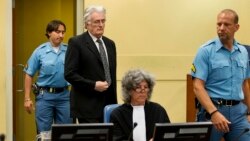Seventy years ago this month, the victors of the Second World War, horrified by crimes committed by the Nazi regime, issued a decree for the prosecution of three crimes: crimes against peace, war crimes, and crimes against humanity.
The decree, now known as the Nuremberg or London Charter, established that perpetrators of murder, extermination, enslavement, deportation, and other inhumane acts committed against a civilian population, before or during the war, could not hide behind their official position in government, nor their obedience to orders from above, to avoid criminal responsibility for participating in such horrendous acts.
Since then, these principles have served as the basis for successive provisions on war crimes and crimes against humanity in the statutes of international hybrid, and domestic tribunals that have charged and prosecuted hundreds of individuals, from the foot soldier all the way up to the head of state, for such crimes.
The International Criminal Tribunal for the former Yugoslavia indicted 161 people for crimes against humanity, war crimes, and genocide committed during the Balkan wars in the 1990s, including former Serbian president Slobodan Milosevic and other political and military leaders.
Similarly, the International Criminal Tribunal for Rwanda indicted 93 individuals accused of being responsible for the 1994 Rwandan Genocide, including dozens of political and military officials. And in Sierra Leone, a special hybrid court convicted, among others, former Liberian President Charles Taylor for his role in aiding, abetting, and planning atrocities committed by rebels in the civil war there.
At one point, these individuals may have believed that they would never have to answer for their crimes. They might have felt justified when perpetrating atrocities because their actions were part either of government policy or of a wide practice that was tolerated or condoned by the government. But no one is above the law.
“From sexual violence in eastern Congo to the brutal torture in the Assad regime’s prisons in Syria, we will continue to seek accountability for the world’s worst crimes,” wrote Secretary of State John Kerry on the occasion of the 70th anniversary of the London Charter. “Such accountability is a stabilizing force in international affairs, and it is what our values – and the memory of the victims – demand.”


















